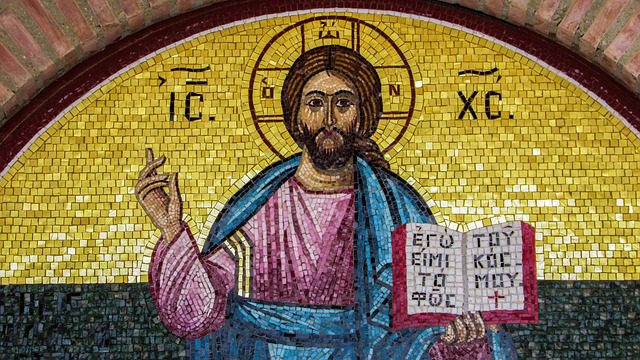But that is only 100 years before the Council of Nicaea. We have writings that go back far earlier than that.
Polycarp (AD 69-155) was the bishop at the church in Smyrna and a disciple of John the Apostle. In his Letter to the Philippians, he writes,
Now may the God and Father of our Lord Jesus Christ, and the eternal high priest himself, the Son of God Jesus Christ, build you up in faith and truth…and to us with you, and to all those under heaven who will yet believe in our Lord and God Jesus Christ and in his Father who raised him from the dead.[4]
Ignatius (AD 50-117) was the bishop at the church in Antioch and another disciple of John. He wrote a series of letters to various churches on his way to Rome, where he was to be martyred. He writes,
There is only one physician, who is both flesh and spirit, born and unborn, God in man, true life in death, both from Mary and from God, first subject to suffering and then beyond it, Jesus Christ our Lord.[5]
For our God, Jesus the Christ, was conceived by Mary according to God’s plan, both from the seed of David and of the Holy Spirit.[6]
Justin Martyr (AD 100–165) was a Christian apologist of the second century. He boldly states,
And that Christ being Lord, and God the Son of God, and appearing formerly in power as Man, and Angel, and in the glory of fire as at the bush, so also was manifested at the judgment executed on Sodom, has been demonstrated fully by what has been said.[7]
Permit me first to recount the prophecies, which I wish to do in order to prove that Christ is called both God and Lord of hosts.[8]
Irenaeus of Lyons (AD 130–202) was bishop of what is now known as Lyons, France. Irenaeus studied under bishop Polycarp, who in turn had been a disciple of John the Apostle. He writes,
He received testimony from all that He was very man, and that He was very God, from the Father, from the Spirit, from angels, from the creation itself, from men, from apostate spirits and demons.[9]
…Christ Jesus our Lord, and God, and Savior, and King, according to the will of the invisible Father.[10]
Clement of Alexandria (AD 150–215) was another early church father. He wrote around AD 200. He writes,
This Word, then, the Christ, the cause of both our being at first (for He was in God) and of our well-being, this very Word has now appeared as man, He alone being both, both God and man….[11]
Tertullian (AD 150-225) was an early Christian apologist writing around a century after John. He said,
For God alone is without sin; and the only man without sin is Christ, since Christ is also God.[12]
Hippolytus of Rome (AD 170-235) was a third century theologian. He was a disciple of Irenaeus, who was a disciple of Polycarp, who was a disciple of John. He writes,
The Logos alone of this God is from God himself; wherefore also the Logos is God, being the substance of God.[13]
For all, the righteous and the unrighteous alike, shall be brought before God the Word.[14]
Then there are the first generation accounts in the Bible from the Apostles (e.g., John 1:1, Colossians 1:15-20), and the words of Jesus Himself (e.g., John 10:30, 14:9), and the prophecies before Jesus was born (e.g., Isaiah 9:6).
Of course, higher critics of the Bible date the New Testament documents that affirm Christ’s divinity very late, assuming that they must have been written in post-apostolic times after the doctrine had been developed. Such circular reasoning is a hallmark of liberal Biblical criticism.
But as more and more ancient manuscripts have been discovered, the dates of the composition of the books in the New Testament are being pushed farther and farther back.
The point is, there is not enough time for a long oral tradition or for the evolution of doctrine. Jesus is Lord, in the words of one of the earliest confessions of faith (Romans 10:9), and all Christians throughout time have always believed that.














